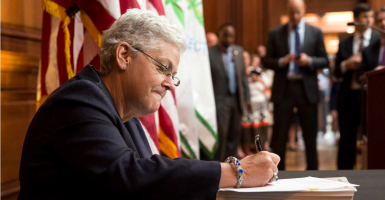A day after the Obama administration finalized a “historic” plan to regulate carbon dioxide emissions, Republicans on a prominent Senate committee are alleging that an outside group colluded with the Environmental Protection Agency to create the standards.
The allegations are detailed in a report released by the majority staff of the U.S. Senate Committee on Environment and Public Works, following an ongoing investigation of the relationship between the EPA and the National Resources Defense Council, a nonprofit environmental advocacy group.
“This majority staff report, based on the committee’s oversight to date, rebuts the Obama Administration’s narrative that NRDC [National Resources Defense Council] did not have any special access to EPA policy makers and that NRDC had minimal input into EPA’s development of greenhouse gas rules for power plants,” the report stated.
On Monday, in an effort President Obama dubbed “the biggest, most important step we’ve ever taken to combat climate change,” the Obama administration finalized a set of greenhouse gas rules for power plants, a controversial action that would overhaul America’s energy system by striving to reduce carbon emissions 32 percent by 2030.
In 2013, President Obama directed the EPA, under the Clean Air Act, to use executive action to carry out the climate change regulations.
Republicans are planning to challenge the legality of the rules in court, and Senate Majority Leader Mitch McConnell, R-Ky., is leading an effort to encourage states not to comply with the plan.
According to the new Senate committee report, years’ worth of unredacted emails between the EPA and National Resources Defense Council officials suggest that the environmental group played an “major role” in the rule-making process prior to the president’s directive.
The report points to a legal challenge from the environmental group that pressured the EPA to regulate power plant emissions, a controversial practice known as “sue-and-settle.”
This practice is used by outside groups to advance a policy goal by suing an agency, in this case the EPA, and the agency then settling the suit by agreeing to enact certain regulations.
In December 2010, the EPA announced a settlement with environmental groups over the power plant emissions, promising to issue a plan.
The report highlights a email conversation—dated the day of the settlement announcement—between current EPA Administrator Gina McCarthy and National Resources Defense Council Director David Doniger.
“Thank you for today’s announcement. I know how hard you and your team are working to move us forward and keep us on the rails…We’ll be with you at every step in the year ahead,” Doniger wrote.
“I really appreciate your support and your patience. Enjoy the holiday. This success is yours as much as mine,” McCarthy responded.
>>>Senator: Emails Reveal EPA, Green Group in ‘Beyond Cozy’ Relationship
A Senate Environment and Public Works Committee aide told The Daily Signal that because of the complexity of the regulations, the timeline of the EPA’s settlement was “unprecedented.”
“The environmentalists were able to keep pressure on the EPA to do the rulings on a quick time frame,” said the aide, who requested anonymity. “Because of the constrained time frames, the EPA deliberations were pretty constrained…in part why they relied so much on the expertise of outside groups.”
National Resources Defense Council communications director Edwin Chen refuted allegations of collusion, telling The Washington Times that the report is another attempt to “stop us from standing up for clean air.”
“We are doing nothing more than petitioning our government—a constitutionally protected right,” Mr. Chen said. “The real wrong here is for anyone to suggest we don’t have the right to do so.”
Following the release of the report, Chairman of Senate Environment and Public Works Committee Sen. Jim Inhofe, R-Okla., vowed to continue investigating the rule-making process behind the administration’s controversial carbon regulations.
“The report exposes how the Obama administration’s collusion with outside environmental groups through the use of sue-and-settle tactics has cornered out public input in the rulemaking process,” Inhofe said. “This report is not the end. The committee will continue to investigate and expose the legally-questionable actions taking place within the Obama administration regarding EPA’s costly rulemaking.”
This article has been modified.



























